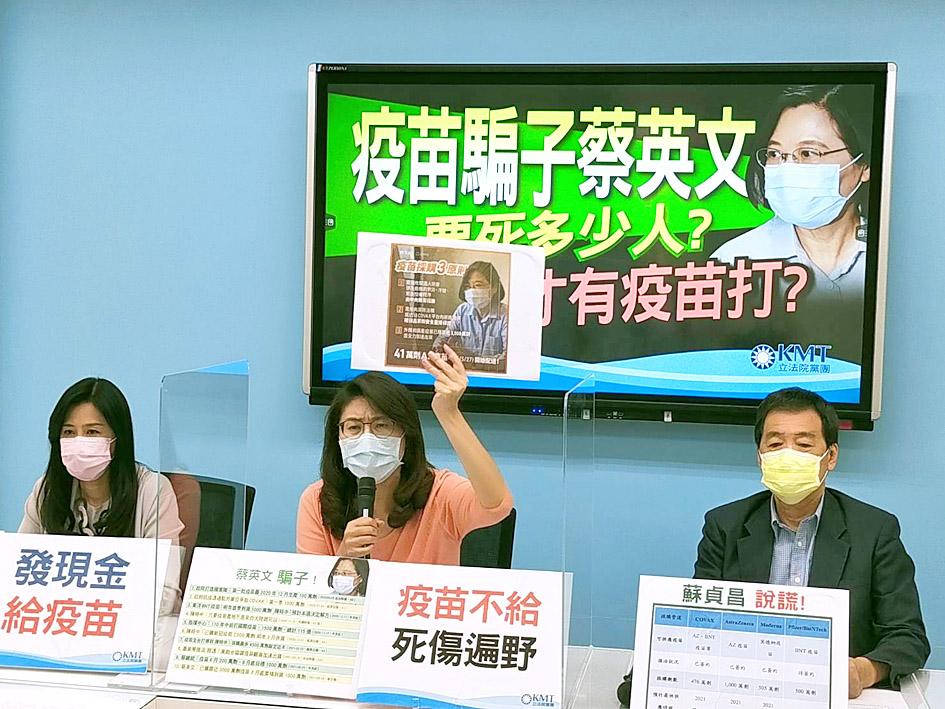Chinese Nationalist Party (KMT) members are “following the same playbook” and “singing the same tune” as the Chinese government as the party pushes for Taiwan to procure Chinese-made COVID-19 vaccines, the Democratic Progressive Party (DPP) said yesterday.
“In the past few days, KMT politicians and auxiliary groups have used terms and descriptions found in leaked instructions to refer to vaccines from China as German-made Pfizer products and downplay the fact that they were produced in China,” DPP spokeswoman Hsieh Pei-fen (謝佩芬) said in a news release.
It is clear that the KMT is instructing its cyberarmy and supporters to conceal the real issues, and instructing them how to counter the advice and information of the Central Epidemic Command Center (CECC), Hsieh said.

Photo: Lin Liang-sheng, Taipei Times
“At this crucial time, KMT politicians are focused on misleading people, creating instability and dissent in society, and turning people against the CECC,” she said, calling on KMT Chairman Johnny Chiang (江啟臣) to make a public apology on the matter.
Minister Without Portfolio Lo Ping-cheng (羅秉成), the Executive Yuan’s spokesman, said that KMT politicians deserve criticism for demanding that COVID-19 vaccines be procured from China.
“China has not been transparent about its domestic situation amid the COVID-19 pandemic or about its vaccines,” Lo told a news conference. “If Taiwan were to obtain vaccines from China, there would be safety and efficacy concerns, and even risk factors.”
“KMT politicians are clamoring for Chinese-made vaccines, but such a move would benefit Beijing’s ‘united front’ propaganda, which is focused on fomenting political dissent and division in Taiwan,” he said.
“Instead of trying to source vaccines from China, it would be better for China to stop its obstruction of Taiwan’s efforts to secure COVID-19 vaccines from the international community,” Lo said.
Vaccines that enter Taiwan must go through strict inspection and evaluation processes to ensure safety and efficacy, he said.
Even emergency use authorization requires compliance with the commercial legal framework, while handling and inspections would require a lot of human resources and funds, meaning that the CECC and other central government authorities would be involved, he said.
Separately yesterday, President Tsai Ing-wen (蔡英文) praised the teams distributing a new batch of AstraZeneca vaccines across the nation, with frontline healthcare workers, police officers and firefighters prioritized to receive jabs.
Tsai thanked officials who helped check the quality of the vaccines.
“We will conduct strict checks to ensure their quality,” she said.

INVESTIGATION: The case is the latest instance of a DPP figure being implicated in an espionage network accused of allegedly leaking information to Chinese intelligence Democratic Progressive Party (DPP) member Ho Jen-chieh (何仁傑) was detained and held incommunicado yesterday on suspicion of spying for China during his tenure as assistant to then-minister of foreign affairs Joseph Wu (吳釗燮). The Taipei District Prosecutors’ Office said Ho was implicated during its investigation into alleged spying activities by former Presidential Office consultant Wu Shang-yu (吳尚雨). Prosecutors said there is reason to believe Ho breached the National Security Act (國家安全法) by leaking classified Ministry of Foreign Affairs information to Chinese intelligence. Following interrogation, prosecutors petitioned the Taipei District Court to detain Ho, citing concerns over potential collusion or tampering of evidence. The

Seventy percent of middle and elementary schools now conduct English classes entirely in English, the Ministry of Education said, as it encourages schools nationwide to adopt this practice Minister of Education (MOE) Cheng Ying-yao (鄭英耀) is scheduled to present a report on the government’s bilingual education policy to the Legislative Yuan’s Education and Culture Committee today. The report would outline strategies aimed at expanding access to education, reducing regional disparities and improving talent cultivation. Implementation of bilingual education policies has varied across local governments, occasionally drawing public criticism. For example, some schools have required teachers of non-English subjects to pass English proficiency

NEGOTIATIONS: The US response to the countermeasures and plans Taiwan presented has been positive, including boosting procurement and investment, the president said Taiwan is included in the first group for trade negotiations with the US, President William Lai (賴清德) said yesterday, as he seeks to shield Taiwanese exporters from a 32 percent tariff. In Washington, US Trade Representative Jamieson Greer said in an interview on Fox News on Thursday that he would speak to his Taiwanese and Israeli counterparts yesterday about tariffs after holding a long discussion with the Vietnamese earlier. US President Donald Trump on Wednesday postponed punishing levies on multiple trade partners, including Taiwan, for three months after trillions of US dollars were wiped off global markets. He has maintained a 10 percent

TRADE: The premier pledged safeguards on ‘Made in Taiwan’ labeling, anti-dumping measures and stricter export controls to strengthen its position in trade talks Products labeled “made in Taiwan” must be genuinely made in Taiwan, Premier Cho Jung-tai (卓榮泰) said yesterday, vowing to enforce strict safeguards against “origin laundering” and initiate anti-dumping investigations to prevent China dumping its products in Taiwan. Cho made the remarks in a discussion session with representatives from industries in Kaohsiung. In response to the US government’s recent announcement of “reciprocal” tariffs on its trading partners, President William Lai (賴清德) and Cho last week began a series of consultations with industry leaders nationwide to gather feedback and address concerns. Taiwanese and US officials held a videoconference on Friday evening to discuss the